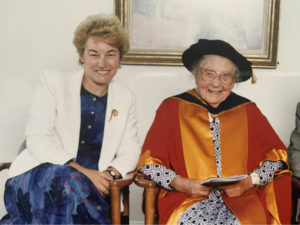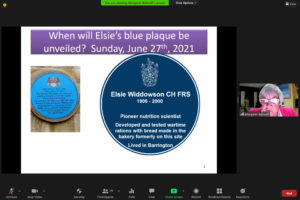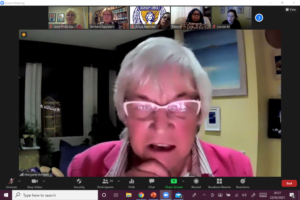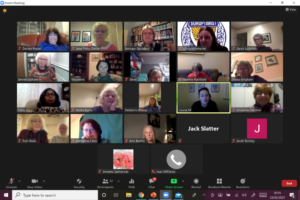“Elsie Widdowson- a woman who inspired action in the world of diet and health”
 What an interesting evening we had on Mon 22 Feb on Zoom when Dr Margaret Ashwell OBE spoke to us about the inspirational Elsie Widdowson CH, CBE, FRS. Elsie’s work undoubtedly improved the health of our nation and saved many lives. Margaret is a public health nutritionist and she is also the biographer of Elsie Widdowson. Margaret is pictured when Elsie received her Honorary Doctorate from University of Salford.
What an interesting evening we had on Mon 22 Feb on Zoom when Dr Margaret Ashwell OBE spoke to us about the inspirational Elsie Widdowson CH, CBE, FRS. Elsie’s work undoubtedly improved the health of our nation and saved many lives. Margaret is a public health nutritionist and she is also the biographer of Elsie Widdowson. Margaret is pictured when Elsie received her Honorary Doctorate from University of Salford.
Read more about the fascinating talk here – and click the links at the bottom of the piece to find out more…
 A chance encounter with Elsie Widdowson’s Secretary, Betty, on an Easter Pilgrimage to St Albans Abbey in 1991, inspired Dr Margaret Ashwell OBE to take on the mammoth task of writing down the stories about Elsie who she had known well in the 1980s. This resulted in her producing McCance and Widdowson’s biography “A Scientific Partnership of 60 Years” so she was able to share memories of an amazing scientist.
A chance encounter with Elsie Widdowson’s Secretary, Betty, on an Easter Pilgrimage to St Albans Abbey in 1991, inspired Dr Margaret Ashwell OBE to take on the mammoth task of writing down the stories about Elsie who she had known well in the 1980s. This resulted in her producing McCance and Widdowson’s biography “A Scientific Partnership of 60 Years” so she was able to share memories of an amazing scientist.
Dr Elsie May Widdowson CH CBE FRS DSc was born in 1906 and died in 2000. She was a pioneer nutrition scientist who  worked in Cambridge and lived in the village of Barrington, Cambridgeshire from 1938. Among her many achievements, Elsie created the first UK food composition tables, tested wartime rations and shaped the modern loaf of bread. Her blue plaque, which will be unveiled on June 27th 2021, will be placed on the site of the village bakery which produced the bread for all of her studies.
worked in Cambridge and lived in the village of Barrington, Cambridgeshire from 1938. Among her many achievements, Elsie created the first UK food composition tables, tested wartime rations and shaped the modern loaf of bread. Her blue plaque, which will be unveiled on June 27th 2021, will be placed on the site of the village bakery which produced the bread for all of her studies.
 One of Elsie’s favourite radio programmes was Just a Minute which encourages participants to speak for a minute on a subject without repetition, hesitation or deviation, but in science these are essential elements. Margaret shared examples from Elsie’s work of how important these elements are to young scientists and how Elsie applied them in her work from the start.
One of Elsie’s favourite radio programmes was Just a Minute which encourages participants to speak for a minute on a subject without repetition, hesitation or deviation, but in science these are essential elements. Margaret shared examples from Elsie’s work of how important these elements are to young scientists and how Elsie applied them in her work from the start.
Repetition : scientists must be able to replicate their results – in different data sets, in different people and using different methods
Hesitation : think what your results mean in the context of your own and others work
Deviation : think outside the box. Ask yourself if things need to be done differently.
From the outset of their partnership, Elsie was prepared to tell Dr Robert McCance (Mac) when she thought he was wrong, such as when the method he had used to measure carbohydrates in fruit and vegetables gave results which were too low for fructose. Later she said the American food tables used in the UK were inappropriate and the UK needed new tables to calculate nutrient intakes from dietary surveys and to devise diets for patients with medical conditions. And the work to produce the British Food tables began and were published before the war.
The value of repetition was shown by testing the effect of minerals injections on themselves, and nearly resulted in disaster when they had severe adverse reactions to strontium lactate and lay rolling on the floor ‘in misery’. An example not to be repeated! Whereas their practical work in Cambridge and its importance for public health led to the fortification of flour with calcium in 1940.
Not satisfied by testing the impact of war time rations on themselves in Cambridge, the two scientists repeated the experiment while undergoing strenuous exercise in the Lake District and reported their results to Government in 1940.”
Regarding hesitation, Elsie said “if your results seem impossible, think and think again’. Comparative results of the impact of German rations on children in two orphanages where Home A received just rations in the first 6 months and group B supplements showed contradictory results when the supplements were later only given to Group A. ”To our astonishment the children in Home A, who had originally grown faster and now received the extra food, immediately began to grow more slowly, while those in Home B began to grow rapidly in weight and height although they had nothing but their German rations.” The explanation, found by a smart dietitian, lay in the movement of a very unkind housemother from the one home to the other half way through the experiment. It showed that the unhappiness of the children was sufficient to delay their growth in spite of extra food. These results were published by the Lancet in 1951, but Margaret said that the interaction of stress and nutrition still requires more work. Maybe now is the time for Soroptimists to press for funding for such work to be done….
Click here to read Margaret’s presentation: Margaret Ashwell Presentation on Elsie Widdowson
Margaret Ashwell’s book, McCance and Widdowson’s biography “A Scientific Partnership of 60 Years” is no longer in print but second-hand copies are available on Amazon.
If you get chance please have a listen to a 2017 edition of “Great Lives” on Radio 4 when Helen Sharman, the first Briton to go into space, tells Matthew Parris why food scientist Elsie Widdowson is her choice for a great life – click here to listen www.bbc.co.uk/programmes/b092mbm2
Elsie Widdowson was covered on Absolute Genius with Dick and Dom in 2017 – click here to view https://www.youtube.com/watch?v=AFsIHG_7Ir4
 On the night it was wonderful to have 30 people attending on Zoom – 13 of whom were guests including Soroptimists, friends and supporters from as far away as Muenster in Germany!
On the night it was wonderful to have 30 people attending on Zoom – 13 of whom were guests including Soroptimists, friends and supporters from as far away as Muenster in Germany!
At the start Margaret said: “I shall tell you some of the stories behind some of Elsie’s achievements and, I hope, leave you in no doubt that she was very inspirational woman who, in her own words, just got on and did things.”
‘Elsie Widdowson- a woman who inspired action in the world of diet and health’. https://en.wikipedia.org/wiki/Elsie_Widdowson
All who attended were indeed inspired! We received many comments saying how interesting everyone had found Margaret’s talk.
About Dr Margaret Ashwell OBE, DSc(Hon), PhD, FAfN, RNutr(Public Health)
Margaret is a Registered Nutritionist and has been President of the Association for Nutrition since 2016. She has been a Research Scientist with the Medical Research Council, Principal of the Good Housekeeping Institute, Science Director of the British Nutrition Foundation and, for more than 25 years, Director of Ashwell Associates, a nutrition science consultancy. Margaret’s ultimate research message only requires a simple piece of string: “Keep your waist to less than half your height”.
Margaret edited the biography of the nutrition pioneers, McCance and Widdowson: A Scientific Partnership of Sixty Years, published in 1993. She describes this project as that which has given, and still gives her, most satisfaction.
There was no charge for the event and it was great that we received some donations for the Steve Sinnott Foundation www.stevesinnottfoundation.org.uk Positive Periods Project, a charity the Club is supporting.

